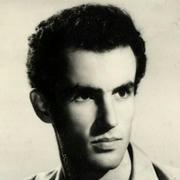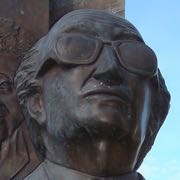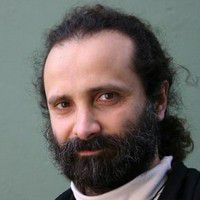Mauricio Sotelo (born 2 October 1961 in Madrid), is a Spanish composer and conductor.
Sotelo began his musical studies as a self-taught player of the guitar, and later at the Real Conservatorio de Música de Madrid. In 1979 he moved to Vienna to study at the University of Music and Performing Arts Vienna. Four years later, after finishing his course with Dieter Kaufmann, among others, he was admitted in the Chair of Composition commanded by Francis Burt – Sotelo dedicated to him the piece De Vinculis: Ge-Burt. A Francis Burt (2001) for violin – and, decisively for him, in Roman Haubenstock-Ramati's seminars, to conclude this academic period in 1987, being awarded the Prize of Honour for graduate studies. During his time in Wien (1979–1992) Sotelo works, created (…et l'avare silence (1988), among others) and participates, together with Beat Furrer, in the creation of the Societé de l'Art acoustique, later known as Klangforum Wien. This group has to be considered a sort of "fetish" ensemble to Sotelo for two reasons: first, the personal relationship with Furrer and the musicians; second, the close and continuous work with them to create many pieces, from the Trio Basso – a R.H.R. (1988–89) to Klangmuro... I (2009) for flute, double bass and ensemble. In Vienna he also studied electroacoustic music with Dieter Kaufmann and conducting with Karl Österreicher. Also at this time, Sotelo came into contact with Luigi Nono, a composer who exercised a lively influence in his musical thought, today even stronger than in those years. He also met the poet José Ángel Valente (Orense 1929 – Geneva 2000) – an unavoidable figure to comprehend Sotelo's catalogue between 1994 and 2000—at the end of the eighties.
Already in Spain, after the successful première of Tenebræ Responsoria in the XXXII Semana de Música Religiosa de Cuenca (1993) with the cantaor Enrique Morente, Sotelo began an important teaching activity. As invited professor, he participated in the Aula de Música at the University of Alcalá de Henares (1993–1995), in the composition seminar at Columbia University in New York (1996), in the Summer Courses of Composition at the International Festival Órgano de León – widely known as Cursos in Villafranca del Bierzo – and, more recently, in the Seminar of Composition Casa da Musica in Oporto (2002), the Chair Manuel de Falla in Cádiz (2007) and the Course of Composition at the Conservatorio Superior de Música in Córdoba (2009).
From the turn to the 21st century, Sotelo consolidated his career in contemporary music, being institutionally recognized and finishing many main pieces like the cycle Wall of Light (2003–2007) – devoted to the figure of Sean Scully – Sonetos del amor oscuro. Cripta sonora para Luigi Nono (2003–2005) and Muerte sin fin (2010), among others.
Mauricio Sotelo has been awarded numerous prizes including the Composition Prize by the Joven Orquesta Nacional de España (1986), by the Sociedad General de Autores y Editores (1989) and by the WDR Forum Junger Komponisten (1992), the Ernst von Siemens Composer's Prize (1997), the Queen Sofia Prize of Composition (2000) and the Spanish National Music Prize (2001). He was composer in residence at the Wissenschaftskolleg zu Berlin (2011–2012) – where he had met the composer Luigi Nono at the end of the eighties. He lives in Berlin and works today as a Professor of Composition at the Escola Superior de Música de Catalunya in Barcelona.








